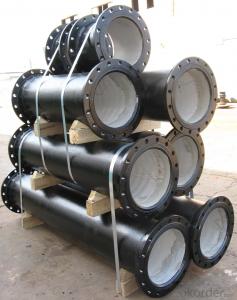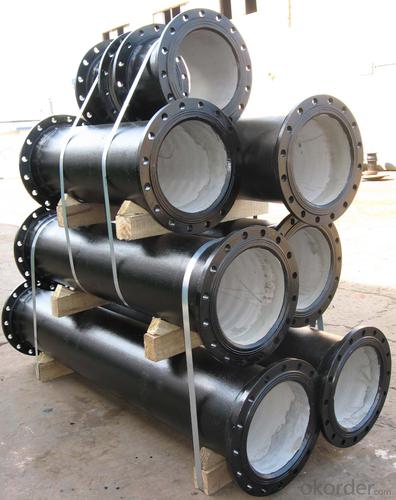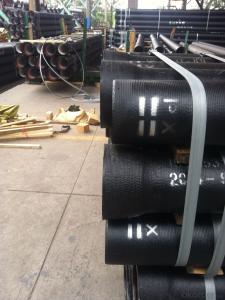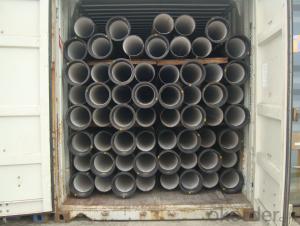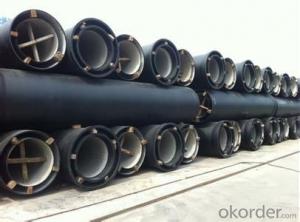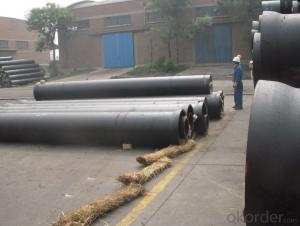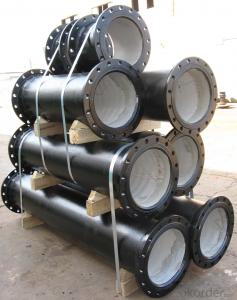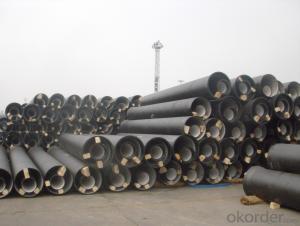DUCTILE IRON PIPES AND PIPE FITTINGS K8 CLASS DN900
- Loading Port:
- Tianjin
- Payment Terms:
- TT OR LC
- Min Order Qty:
- 22 pc
- Supply Capability:
- 3000 pc/month
OKorder Service Pledge
OKorder Financial Service
You Might Also Like
Material : Ductile Cast Iron
Size Range : DN 80mm to DN 2000mm
Unit Effective Length : 6m or 5.7m
Manufacture Standard: ISO 2531:1998/ EN 545:2006/EN 598:2007
Annual capacity : 200,000 tons
Coating Exterior: Zinc 130g/m2 according to ISO 8179-1 and bitumen coating 70 microns.
Cement Interior: Portland Cement/ High Alumina Cement/ Sulphate Resisting Cement Lining according to ISO 4179
Special requirements on external coating and internal lining can be applied
We also provide accessories such as SBR/EPDM rubber gaskets, lubricant paste, pipe caps, PE sleeves, etc.
Additional Parts:
Each pipe is strictly inspected according to related standard to ensure permanently high performance.
Easy Installation at site and service free for life
Long Service Lifespan
Quotation will arrive you within 24hours once we get your inquiry.
We guarantee offering you a competitive price.
A copy of original inspection reports of pipes will be offered after shipment.
Photos of loading process will be sent to the customer after shipment effect.
We will follow-up the delivery progress after shipment effect and update to the customer on weekly basis.
- Q: How does ductile iron pipe perform in areas with high soil settlement?
- Ductile iron pipe has gained a reputation for its exceptional performance in regions where soil settlement is significant. Thanks to its inherent strength and durability, it remains structurally intact under the pressures exerted by settling soil. The ductile iron pipe's flexible nature enables it to accommodate ground movements caused by soil settlement, thereby reducing the risk of pipe failure or damage. Its adaptability to these movements helps prevent cracks, leaks, and breaks that may occur in more rigid pipe materials. Furthermore, the strong resistance of ductile iron pipe to corrosion provides an additional advantage in areas with high soil settlement. It can withstand the corrosive effects of the soil and other environmental factors, ensuring the pipe system's longevity and reliability. In regions with substantial soil settlement, ductile iron pipe is often the preferred choice due to its ability to handle ground movements without compromising performance. Its strength, flexibility, and corrosion resistance make it an ideal solution for maintaining a robust and efficient water distribution system, even in challenging soil conditions.
- Q: Are ductile iron pipes suitable for mining applications?
- Yes, ductile iron pipes are suitable for mining applications. Ductile iron pipes are known for their strength, durability, and resistance to corrosion, making them ideal for underground mining operations. They can withstand high pressure, heavy loads, and abrasive materials commonly found in mining environments. Additionally, their flexible nature allows for easy installation and maintenance in challenging mining conditions.
- Q: Are ductile iron pipes suitable for use in paper mills?
- Ductile iron pipes, known for their strength and durability, are well-suited for paper mills. With their excellent performance in various industrial settings, including paper mills, these pipes are able to withstand high-pressure systems and resist corrosion. This makes them suitable for transporting water, chemicals, and other fluids commonly used in paper mills. Moreover, the impact resistance of ductile iron pipes is advantageous in an environment with heavy machinery and equipment. In summary, ductile iron pipes are a dependable and enduring choice for paper mills, thanks to their strength, durability, corrosion resistance, and ability to handle high-pressure systems.
- Q: How can 4 inch ductile iron pipe be connected with 2 inch galvanized pipe?
- The general electric welded steel pipe for clarinet.
- Q: Are ductile iron pipes available for cutting and are there any relevant specifications?
- You can cut, there should be no specification requirements, as long as you can use, in line with the needs of the project can
- Q: Can ductile iron pipe be used for wastewater treatment plant sludge dewatering?
- Yes, ductile iron pipe can be used for wastewater treatment plant sludge dewatering. Ductile iron pipe is known for its durability and corrosion resistance, making it suitable for applications in wastewater treatment plants. It can effectively handle the sludge dewatering process and provide reliable performance for long-term use.
- Q: How can the three pipes of ductile iron leak?
- When the pipe connection of the three water leakage, first of all to see whether it is to do the pipe three links of the manufacturers, pressure did not reach, if it is. It is only the replacement, if not, with cast iron electrode welding, or socket connection half!
- Q: Are ductile iron pipes suitable for use in sewage pumping stations?
- Yes, ductile iron pipes are suitable for use in sewage pumping stations. Ductile iron is known for its high strength, durability, and corrosion resistance, making it an ideal material for handling the challenging and corrosive conditions found in sewage systems. Additionally, ductile iron pipes have excellent hydraulic performance and can withstand the high pressures and flow rates typically encountered in sewage pumping stations.
- Q: How many casting methods are there in ductile iron casting? A 60*6 discus can not have sand holes. Its surface is smooth. What process can be used to make it?
- This is such a small piece, do not worry about shrinkage, mainly pay attention to sand hole and slag. With Disa wet molding line, a box of more pieces, suitable for mass production, defects will be relatively less. By using other methods (resin sand coated sand, etc.) can also be the main attention, don't type it, then the level of liquidity and relatively ductile iron, gray iron poor, sand and gas can not go up, sand holes or pores will spread in the discus plane.
- Q: How does ductile iron pipe perform in extreme weather conditions?
- Ductile iron pipes are renowned for their exceptional performance in adverse weather conditions. These pipes demonstrate remarkable durability, resistance, and flexibility, making them suitable for enduring harsh weather such as extreme temperatures, heavy rainfall, snowfall, and even earthquakes. One of the notable characteristics of ductile iron is its capacity to withstand damage caused by freezing temperatures. Unlike other materials, ductile iron pipes possess a low coefficient of thermal expansion, enabling them to resist the expansion and contraction that occurs during freeze-thaw cycles without experiencing cracks or breaks. Consequently, these pipes remain intact and continue to function optimally even in extremely cold conditions. Furthermore, ductile iron pipes exhibit excellent resistance to corrosion, rendering them highly resilient to the corrosive effects of severe weather. They are shielded by a sturdy zinc coating, which acts as a barrier against rust and other forms of corrosion. This coating, in conjunction with the inherent strength of ductile iron, grants these pipes exceptional resistance to the corrosive effects of rain, snow, and moisture. Moreover, ductile iron pipes possess superior flexibility, allowing them to accommodate ground movement and seismic activity. In areas prone to earthquakes or soil shifting, these pipes can absorb stress and strain without fracturing, guaranteeing a continuous supply of water and sewage services even in the most challenging weather conditions. Overall, ductile iron pipes excel in extreme weather conditions due to their durability, resistance to freezing, corrosion, and flexibility. Their ability to withstand the elements ensures an uninterrupted supply of water and sewage systems, providing reliability and peace of mind to utility providers and communities, even in the most unforgiving environments.
Send your message to us
DUCTILE IRON PIPES AND PIPE FITTINGS K8 CLASS DN900
- Loading Port:
- Tianjin
- Payment Terms:
- TT OR LC
- Min Order Qty:
- 22 pc
- Supply Capability:
- 3000 pc/month
OKorder Service Pledge
OKorder Financial Service
Similar products
Hot products
Hot Searches
Related keywords
